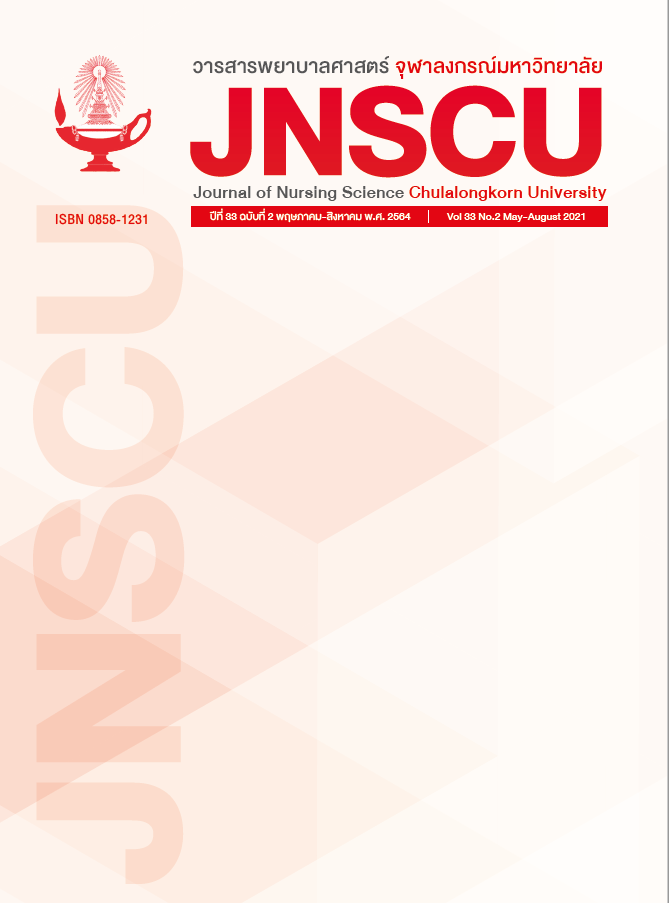ปัจจัยทำนายสภาวะส่วนบุคคล ความทุกข์ทรมานจากอาการ และพฤติกรรมการจัดการอาการต่อคุณภาพชีวิตของผู้ป่วยเนื้องอกสมอง
คำสำคัญ:
ปัจจัยสภาวะส่วนบุคคล, ความทุกข์ทรมานจากอาการ, พฤติกรรมการจัดการอาการ, คุณภาพชีวิต, ผู้ป่วยเนื้องอกสมองบทคัดย่อ
วัตถุประสงค์ทั่วไป: เพื่อศึกษาอำนาจการทำนาย ได้แก่ สภาวะส่วนบุคคล ความทุกข์ทรมานจากอาการและพฤติกรรมการจัดการอาการต่อคุณภาพชีวิตในผู้ป่วยเนื้องอกสมอง
รูปแบบการวิจัย: การวิจัยเชิงทำนาย
วิธีการดำเนินการวิจัย: กลุ่มตัวอย่าง คือ ผู้ป่วยเนื้องอกสมองปฐมภูมิที่มาติดตามการรักษาในโรงพยาบาลรัฐบาลในเขตบริการสาธารณสุข กรุงเทพมหานคร 2 แห่ง จำนวน 143 ราย เครื่องมือวิจัยประกอบด้วย 1) ข้อมูลสภาวะส่วนบุคคล 2) ความทุกข์ทรมานจากอาการ 3) พฤติกรรมการจัดการอาการ และ 4) คุณภาพชีวิตที่เกี่ยวข้องกับสุขภาพ วิเคราะห์ข้อมูลด้วยสถิติเชิงพรรณนา วิเคราะห์ความสัมพันธ์และหาปัจจัยทำนายด้วยสถิติไคสแควร์ สถิติสหสัมพันธ์เพียร์สัน และสถิติถดถอยพหุคูณ
ผลการวิจัย: ผู้ป่วยเนื้องอกสมองมีคุณภาพชีวิตโดยรวมอยู่ในระดับดี ความทุกข์ทรมานจากอาการโดยรวมอยู่ในระดับปานกลาง พฤติกรรมการจัดการอาการโดยรวมอยู่ในระดับน้อย และพบว่าปัจจัยที่มีอิทธิพลทำนายคุณภาพชีวิตของผู้ป่วยเนื้องอกสมองอย่างมีนัยสำคัญทางสถิติที่ระดับ .05 ได้แก่ ความทุกข์ทรมานจากอาการ พฤติกรรมการจัดการอาการ ตำแหน่งเนื้องอกสมองที่ Frontal lobe ตำแหน่งเนื้องอกสมองที่ Temporal lobe
สรุป: ผลการวิจัยทำให้ได้ข้อมูลที่มีประโยชน์ สามารถนำไปเป็นข้อมูลพื้นฐานสำหรับวางแผนส่งเสริมพฤติกรรมการจัดการอาการของผู้ป่วยโรคเนื้องอกสมอง เพื่อบรรเทาความทุกข์ทรมาน และส่งเสริมคุณภาพชีวิตได้ต่อไป
เอกสารอ้างอิง
Strong MJ, Garces J, Vera JC, Mathkour M,
Emerson N, Ware ML. Brain tumors:
epidemiology and current trends in
treatment. J brain tumor neurooncol
; 1(1): 1-21.
Institute of Neurology. Guidelines for nursing
patients with brain tumor surgery For
general nurses. Bangkok: Thanaphan
Co., Ltd; 2014.
American Cancer Society. Survival rates for
selected adult brain and spinal cord
tumors [Internet]. 2020 [cited 2019
Jun 11]. Available from: https://www.
cancer.org/content/dam/CRC/PDF/
Public/8569.00.pdf
Boonkerd A. Brain tumor [Internet]. 2016
[cited 2019 Jun 11]. Available from:
http://med.mahidol.ac.th/surgery/sites/
default/files/public/pdf/PDFneuro/4.
pdf.
Niemelä A, Koivukangas J, Herva R, Hakko H,
Räsänen P, Mainio A. Gender difference
in quality of life among brain tumor
survivors. JNN 2011; 2(4): 1-5. Doi:10.4172/
-9562.1000116.
Wilson IB, Cleary PD. Linking clinical variables
with health-related quality of life: a
conceptual model of patient outcomes.
JAMA 1995; 273(1): 59-65.
Saban KL, Penckofer SM, Androwich I, Bryant
FB. Health-related quality of life of
patients following selected types of
lumbar spinal surgery: a pilot study.
Health Qual 2007; 5(1): 1-11. Doi:10.1186/
-7525-5-71.
Asanok A, Jitpanya C, Kaoroptham S. Selected
factors related to quality of life in adult
patients with brain tumor after the
operation. Public Health Nurs 2008;
(2): 45-60.
Dodd MJ, Miaskowski C, Lee KA. Occurrence
of symptom clusters. JNCI Monographs
; 32: 76-8. Doi.org/10.1093/
jncimonographs/lgh008
Cleeland CS, Mendoza TR, Wang XS, Chou
C, Harle MT, Morrissey M, et al. Assessing
symptom distress in cancer patients:
the MD Anderson Symptom Inventory.
Cancer 2000; 89(7): 1634-46. Doi:
1002/1097-0142(20001001)89:7
<1634::aid-cncr29>3.0.co;2-v.
Chiannilkulchai N, Thosingha O, Asdornwised
U, Sarnvivad P, Viwatwongkasem C.
Primary brain tumors in Thais: Symptom
experience and predicting factors. Pac
Rim Int J Nurs Res 2016; 20(4): 275-92.
(in Thai)
Weitzner MA, Meyers CA, Gelke CK, Byrne
KS, Levin VA, Cella DF. The Functional
Assessment of Cancer Therapy (FACT)
scale. Development of a brain subscale
and revalidation of the general version
(FACT-G) in patients with primary brain
tumors. Cancer 1995; 75(5): 1151-61.
Armstrong TS, Cron SG, Bolanos EV, Gilbert
MR, Kang DH. Risk factors for fatigue
severity in primary brain tumor patients.
Cancer 2010; 116(11): 2707-15.
Phimsarn P, Jitpanya C. Relationships among
symptom cluster, method of coping and
health related quality of life in brain
tumor patients receiving brain surgery.
HCU Journal 2016; 20(39): 57-68.
ดาวน์โหลด
เผยแพร่แล้ว
ฉบับ
ประเภทบทความ
สัญญาอนุญาต

อนุญาตภายใต้เงื่อนไข Creative Commons Attribution-NonCommercial-NoDerivatives 4.0 International License.
##default.contextSettings.thaijo.licenseTerms##


